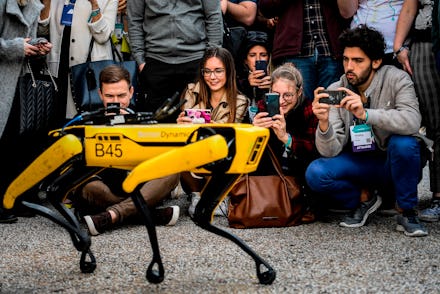Rich people can now buy their own robot guard dogs for just $74,500

If you've got a lot of money to burn and really like that slightly terrifying yellow robo-dog you've seen on YouTube, you're in luck. Boston Dynamics, the robotics company behind the beast, is making the four-legged robot available for sale to the general public for a cool $74,500. The robot dog, called Spot, is expected to help businesses and corporations with surveying and observing places that might be hazardous to humans.
Before you start panicking about a robot takeover and locking away your knives, remember that Spot's skills are still limited. It only has attachments like sensors, scanners, and cameras that can measure or record data for users. At this point, Spot is mostly used for its patrolling and observational skills, which come in handy when a facility needs someone to repeatedly inspect an area "so often that it would drive [a human] mad," Boston Dynamics' lead robotics engineer, Zack Jackowski, told The Verge. An update later this year, however, is expected to allow the control of a robotic arm attachment that will give Spot additional uses.
Despite Spot's limited abilities, it has already had test runs in the healthcare, construction, oil and gas, and public safety industries. In April, Boston Dynamics worked with Bringham and Women's Hospital in Massachusetts to see what roles the robot could play to help hospitals reduce staff exposure to diseases like coronavirus. During this test, Spot found the most promise in providing telemedicine to patients by delivering an iPad and two-way radios. Boston Dynamics also hoped to figure out a way to remotely monitor a patient's body temperature and oxygen rate through Spot.
Meanwhile, in Singapore, Spot has seen action as a social distancing enforcer, trotting up to people to remind them to maintain space between each other using a speaker and a pre-recorded warning. There didn't seem to be much else the robo-dog could do other than issue warnings, but Singapore officials believed it could potentially help law enforcement reduce the amount of staff they needed to patrol the parks.
The use of Spot by military or law enforcement has come up as a concern by civil rights advocates in the past. In 2019, Massachusetts law enforcement tested the use of the robot for dangerous settings like bomb-detection and hostage situations. The ACLU branch within the state raised warnings and called for transparency over the use of robots like Spot, citing an incident in 2016, in Texas, where a police robot was rigged with explosives and sent in like a suicide bomber to take out a sniper who killed five people.
Right now, with trust in the police hitting a low among non-white individuals, the idea of these things being used by law enforcement is especially disconcerting.
In an interview with The Verge, Boston Dynamics acknowledged that selling Spot to the public comes with the risk of buyers using the robo-dog however they want. There isn't much they can do to stop someone from attaching harmful objects to it, the same way people have attached flamethrowers onto drones, though the company expressed hope that the high price and physical weaknesses (it's not too hard to knock Spot over) would deter people from wasting their purchase in such a way.
Spot has been through a lot over the years. It has gone from a bulky four-legged robot to a sleek 'mini' version that eventually became the final size. It has endured hockey sticks obstructing its tasks and engineers knocking it on its side over and over again to test its recovery. Now, it's finally become a consumer product that's fit for any home that can afford it. Here's to hoping Spot doesn't get jealous of our real dogs.